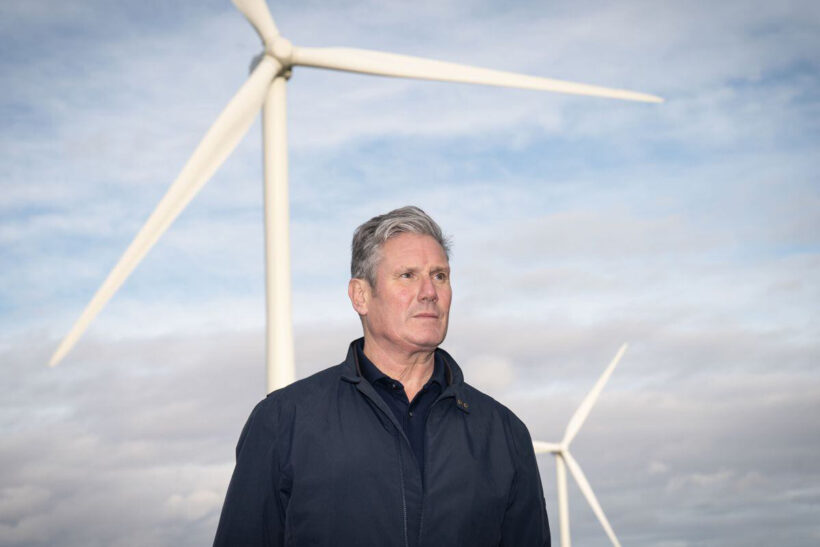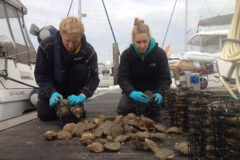The Crown Estate has confirmed completion of the next step – a formal opening of the tendering process – in the development of three wind farm sites off the coast of South Wales and South West England, as well as outlining a new integrated approach to the development of appropriate shore-based infrastructure to maximise the benefits of the new wind farms.
As promised during the election campaign, a new taxpayer-owned company, Great British Energy, is being created, which will work with the Crown Estate to support the delivery of clean energy infrastructure.
This is the first offshore leasing round to be brought to market with an agreed plan for connecting the new wind farms to the UK’s electricity grid, which was also published last week. New legislation already laid before parliament will pave the way for the Crown Estate to borrow against its portfolio, to support the creation of the infrastructure needed.
The Crown Estate said: “It is hoped those model will act as a template for future leasing rounds, helping further accelerate the deployment of offshore wind.”
The three sites, which between them will occupy around 1,000km2 of seabed, are forecast to be able to deliver around 4GW of electricity, enough for around four million homes.
The second phase of the leasing process, which got underway on 8 August, will see bidders set out plans for delivering the new wind farms, as well as details of how their plans will support the delivery of wider social and economic benefits for onshore communities.
This comes after a disastrous leasing round in 2023 that failed to see a single bid for offshore wind, due to a combination of skyrocketing costs in the offshore sector, and a low ‘contract for differences’ offered by the Crown Estate. Price guarantees for offshore wind have since been increased by 66%, and of the £1.5bn earmarked by the government to support the latest round of clean energy, £1.1bn has been allocated for offshore power, with just £400m for shore-based wind and solar.
Over the last decade, the Crown Estate has made around £4bn in profit from offshore wind leases, the majority of which is passed to the Treasury, after the King has taken his slice, which helps towards the upkeep of his royal residences, his fleet of Bentleys and his not so eco- friendly helicopter.
The final stage of the process will see offshore wind developers take part in an auction to secure rights to the three project development areas, expected in the first half of 2025. Agreements for lease are expected to be signed in summer 2025.
NFFO chief executive Mike Cohen told Fishing News: “The Crown Estate has been far more willing to talk to us ahead of this leasing round than it was in the past. It’s just as well, since it is increasingly apparent that the only practical way to mitigate the impact of these developments is to influence where they are built.
“Lots of fishermen spoke to the Crown Estate to identify the most sensitive areas of the Celtic Sea for fishing. As a result, we have ended up with three sites being offered up for lease that avoid all of these. This is a significant improvement over the way that things were done on the east coast in previous leasing rounds.
“Let’s not forget, though, that the Crown Estate and the wind farm developers will make enormous profits from parcelling out our seabed like this. Surely talking to us in advance and taking some basic steps not to irreparably damage fishing businesses and coastal communities is the very least that we should be able to expect.
“If this is how the UK is going to use its seas, we should be using some of those profits to ensure a just transition for the people and industries who will be harmed by that decision.
The last government seemingly had no interest in holding that conversation; perhaps the new one will.”
Chris Ranford, CEO of the Cornish FPO, has been involved in the discussions on siting of the new floating farms since their first inception, hosting meetings between the Crown Estate and the fishing industry across a number of Cornish ports.
He told FN: “It was clear from the outset that we had to work smartly and use the immense amount of knowledge, evidence and data the fishing industry holds for the Celtic Sea. From mapping a combination
of landings (volume and value) with VMS, AIS and plotter data, and then getting a skipper with multiple generations of fishing knowledge to present the data, explain the trends and important areas, as well as highlight the gaps and opportunities, the CFPO has been a key component of the planning process to enable the next step of renewables in the Celtic Sea.
“The Crown Estate has benefited immensely from working with the CFPO, and this shows the importance of bringing the industry in as early as possible in the planning process.
“However, with up to a further 12GW being touted for the Celtic Sea, the new government has some big decisions to make.
Any additional floating wind on top of the current 4.5GW would devastate the Cornish fleet; furthermore, this could become very complex, with the international fleet also set to be displaced.
“Do they choose an industry that has evolved over centuries and offers real jobs (one fisherman in Cornwall equals 15 more in the Cornish seafood supply chain), that supplies a low-carbon source of healthy, nutritious protein, which also plays a vital role in achieving net zero as a dietary option and meeting the national food security needs? Or does the government prioritise energy?
“Ultimately, we want to be in a position where thorough and early planning with good evidence limits the need to prioritise one over the other. This is how we have arrived at the current situation, and I would say the Celtic Sea has now reached its limit for floating offshore wind, and the fishing industry’s willingness to work with and allow 4.5GW has been a great sign of compromise.”
Energy security and net zero secretary Ed Miliband said: “Floating offshore wind is a world-leading technology that can play a vital role in our efforts to boost energy independence, create good jobs and tackle the climate crisis.
“Already, the Crown Estate has formed an exciting new partnership with Great British Energy, and this latest leasing round offers even more opportunities to deliver these projects.
“This, combined with over £1.5bn we’re offering through the next Contracts for Difference auction, will give developers the confidence to deliver here – and help us reach clean power by 2030.”
This story was taken from the latest issue of Fishing News. For more up-to-date and in-depth reports on the UK and Irish commercial fishing sector, subscribe to Fishing News here or buy the latest single issue for just £3.30 here.
Sign up to Fishing News’ FREE e-newsletter here.






